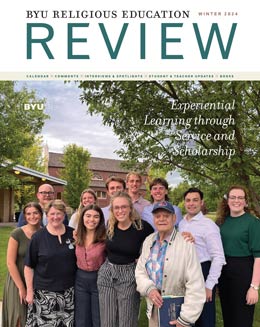Religion is Love in Action
Editor's Note
Jared Ludlow, Publications Director
One of the messages of the Epistle of James in the New Testament is that religion is more than something we read and learn about, it is something we do, especially in our communities among those who need it the most—the widow, the orphan, and so forth (see James 1:27). Those same principles apply to lived religion today and the importance of extending ourselves to help others. King Benjamin taught something similar in his great sermon when he said, “Ye will not suffer that the beggar putteth up his petition to you in vain, and turn him out to perish” (Mosiah 4:16). King Benjamin tied our retaining a remission of sins to how we assist others: “For the sake of retaining a remission of your sins from day to day, that ye may walk guiltless before God—I would that ye should impart of your substance to the poor, every man according to that which he hath, such as feeding the hungry, clothing the naked, visiting the sick and administering to their relief, both spiritually and temporally, according to their wants” (Mosiah 4:26).
Our feature article highlights the work some faculty with students have done to learn about and do more in communities of need as Andy Reed and Mike MacKay prepared a group of students to serve near BYU as well with an interfaith organization in Boise. Through a newly designed course, “Interfaith Leadership and Ethics” (REL C 393R), their efforts emphasize the value of experiential learning and mentoring. As they point out, “Students who have positive experiences with dialogue rather than debate develop more favorable views of the good that other religions offer society. As part of this process, they also see methods and examples of civic cooperation, religious devotion, and faith-filled service that simply are not experienced in other settings.”
This calendar year, we are focused on the Book of Mormon as the key scripture text for Come, Follow Me. Several articles and summaries in this issue introduce us to various manuscripts prepared by the RSC to assist one’s study of the Book of Mormon. In one article, author John Hilton discusses his book on the 149 various voices or testimonies within the Book of Mormon. Based on word clouds, he points out the distinctive words and emphases of the various Book of Mormon writers and speakers that can give us insight into their teachings and personality. Because it is also an election year in the United States, it is timely to present a new volume that shares Latter-day Saint politicians’ own words from interviews on how they have navigated their political responsibilities with their faith. It covers some local politicians from Utah, national ones in the United States, and political leaders from other parts of the world. It demonstrates that being a member of the Church does not require only one political approach to the issues that face society. Lastly, Steven Harper shares the great things the Wilford Woodruff Papers Foundation has been doing to provide public access to President Woodruff’s vast writings (around thirty-five thousand pages!). It is a tremendous blend of technology, editorial oversight, administrative management, donor support, and student involvement.
As we study the restored gospel and seek to strengthen our discipleship, may we also remember to practice our religion in our day-to-day lives by loving as Jesus did.
Jared W. Ludlow
Publications Director
BYU Religious Studies Center
